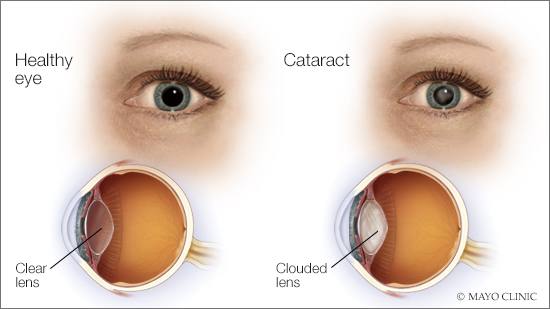-
Cardiovascular
Consumer Health: Do you need cataract surgery?

Cataract surgery
If you're finding it harder to read, drive at night or see someone's expression, cataracts may be to blame. A cataract is a clouding of the normally clear lens of your eye. For people who have cataracts, seeing through cloudy lenses is like looking through a frosty or fogged-up window. Cataract surgery is a procedure to remove the lens of your eye and, in most cases, replace it with an artificial lens. Here's what you need to know.
***
Also in today's tips ...
Video: '4 Ways to Prevent Heart Attack'
Don't smoke. Maintain a healthy weight. Eat your fruits and veggies. Get enough exercise. These are the four lifestyle choices you can make that will significantly reduce your risk of heart attack or stroke. Learn more from Dr. Stephen Kopecky, a Mayo Clinic cardiologist.
Are you getting the most out of your workout?
When you exercise, are you working hard or hardly working? Exercising at the correct intensity can help you get the most out of your physical activity — making sure you're not pushing too hard or too little. Here's a look at what exercise intensity means and how to maximize your workout.
Can vitamin D prevent Alzheimer's and dementia?
Research suggests that people with low levels of vitamin D in their blood, a condition known as vitamin D deficiency, are more likely to develop Alzheimer's disease and other forms of dementia. But at this point, the association between vitamin D deficiency and dementia risk is only observational. More studies are needed to determine if vitamin D deficiency is indeed a risk factor for Alzheimer's disease and dementia, and if the use of vitamin D supplements or sun exposure can prevent or treat these conditions. Learn more from Dr. Jonathan Graff-Radford, a Mayo Clinic neurologist.
Lupus and kidney inflammation
About half the people who have systemic lupus erythematosus develop some form of kidney inflammation, called "lupus nephritis." This inflammation can lead to kidney failure, but the course of lupus and its effects on the kidneys is variable and hard to predict. Learn more from Dr. Carl Anderson, an emeritus Mayo Clinic nephrologist.







